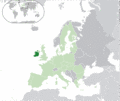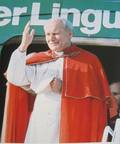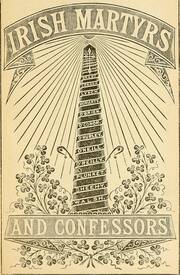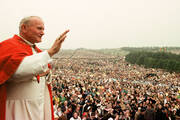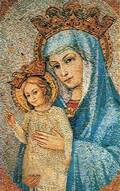IRELAND - ÉIRE
Patron saint of Ireland - Saint Patrick
Pope St John Paul II was a pilgrim to Ireland in 1979, for the centenary of the apparition of Our Lady at Knock. Pope Francis came on pilgrimage in 2018.
In 2010 Papa Benedict XVI wrote a very important and profound Pastoral Letter to all the Catholics of Ireland, "expressing his dismay at the sexual abuse of young people by Church representatives and the way this was addressed by local bishops & religious superiors. He asks that the Letter be read with attention and in its entirety. The Holy Father speaks of his closeness in prayer to the whole Irish Catholic community at this painful time and he proposes a path of healing, renewal and reparation."
So many Irish people have generously given responses to Totus2us podcasts (a great witness to the faith of the Irish), they are shown here alphabetically by Christian name: beginning with A - F, G - J, K - M and N - Z - many thanks to you all ♥
St Oliver Plunkett was beatified by Benedict XV on 23 May 1920 and canonized by St Paul VI on 12 October 1975 (at which Karol Woytyla, Cardinal of Cracow, was present at the invitation of his friend Cardinal Conway).
On 15 December 1929 Pope Pius XI beatified John Carey (aka Terence Carey) & Patrick Salmon (both laymen, martyred on 4 July 1594 in Dorchester, England).
On 22 November 1987 Pope St John Paul II beatified Charles Meehan (alias Mahoney, a Franciscan who was martyred on 21 August 1679 in Ruthin, Wales).
On 27 September 1992 Pope St John Paul II beatified 17 Irish martyrs: Margaret Bermingham Ball (m 1584, Dublin), Patrick Cavanagh (m 5 July 1581, Wexford), Edward Cheevers (m 5 July 1581, Wexford), Dominic Collins (Jesuit lay brother from Youghal, m County Cork, 31 October 1602), John Kearney (Franciscan Prior of Cashel, m 1653), Matthew Lambert (m 5 July 1581, Wexford), Maurice MacKenraghty (Chaplain to the Earl of Desmond, m 1585), Robert Myler (m 5 July 1581, Wexford), Terence Albert O'Brien OP (Bishop of Emly, m 31 October 1651), Conor O'Devany (Franciscan Bishop of Down & Connor, m 11 February 1612), Patrick O'Healy (Franciscan Bishop of Mayo, 31 August 1579), Peter O'Higgins OP (Prior of Naas, m 23 March 1642), Dermot O'Hurley (Archbishop of Cashel, m 20 June 1584), Patrick O'Loughran (priest from County Tyrone, m 11 February 1612), Conn O'Rourke (Franciscan priest, m 31 August 1579), Francis Taylor (former Mayor of Dublin, m 1621), William Tirry (Augustinian priest from Cork, m 12 May 1654).
To download the free mp3 Totus2us audio recordings, right / double click on the blue play buttons.
(Part of) St JPII's homily at Mass with the beatification of 17 Irish Martyrs
St Peter's Square, Sunday 27 September 1992 - in Italian
""My soul, give praise to the Lord”.
And how can we fail to sing the praises of the seventeen Irish Martyrs being beatified today? Dermot O’Hurley, Margaret Bermingham Ball, Francis Taylor and their fourteen companions were faithful witnesses who remained steadfast in their allegiance to Christ and his Church to the point of extreme hardship and the final sacrifice of their lives.
All sectors of God’s people are represented among these seventeen Servants of God: bishops, priests both secular and religious, a religious brother and six lay people, including Margaret Bermingham Ball, a woman of extraordinary integrity who, together with the physical trials she had to endure, underwent the agony of being betrayed through the complicity of her own son.
We admire them for their personal courage. We thank them for the example of their fidelity in difficult circumstances, a fidelity which is more than an example: it is a heritage of the Irish people and a responsibility to be lived up to in every age.
In a decisive hour, a whole people chose to stand firmly by its covenant with God: “All the words which the Lord has spoken we will do”. Along with St Oliver Plunkett, the new Beati constitute but a small part of the host of Irish Martyrs of Penal Times. The religious and political turmoil through which these witnesses lived was marked by grave intolerance on every side. Their victory lay precisely in going to death with no hatred in their hearts. They lived and died for Love. Many of them publicly forgave all those who had contributed in any way to their martyrdom.
The Martyrs’ significance for today lies in the fact that their testimony shatters the vain claim to live one’s life or to build a model of society without an integral vision of our human destiny, without reference to our eternal calling, without transcendence. The Martyrs exhort succeeding generations of Irish men and women: “Fight the good fight of the faith; take hold of the eternal life to which you were called ... keep the commandment unstained and free from reproach until the appearing of our Lord Jesus Christ”.
To the Martyrs’ intercession I commend the whole people of Ireland: their hopes and joys, their needs and difficulties. May everyone rejoice in the honour paid to these witnesses to the faith. God sustained them in their trials. He comforted them and granted them the crown of victory. May he also sustain those who work for reconciliation and peace in Ireland today!
Blessed Irish Martyrs, intercede for the beloved Irish people!"
St John Paul II's homily at Mass in Drogheda 
Ireland, 29 September 1979
"I join my voice today to the voice of Paul VI and my other predecessors, to the voices of your religious leaders, to the voices of all men and women of reason, and I proclaim, with the conviction of my faith in Christ and with an awareness of my mission, that violence is evil, that violence is unacceptable as a solution to problems, that violence is unworthy of man. Violence is a lie, for it goes against the truth of our faith, the truth of our humanity. Violence destroys what it claims to defend: the dignity, the life, the freedom of human beings. Violence is a crime against humanity, for it destroys the very fabric of society. I pray with you that the moral sense and Christian conviction of Irish men and women may never become obscured and blunted by the lie of violence, that nobody may ever call murder by any other name than murder, that the spiral of violence may never be given the distinction of unavoidable logic or necessary retaliation. Let us remember that the word remains for ever: "All who take the sword will perish by the sword".
10. There is another word that must be part of the vocabulary of of every Christian, especially when barriers of hate and mistrust have been constructed. This word is reconciliation. "So if you are offering your gift at the altar, and there remember that your brother has something against you, leave your gift there before the altar and go; be reconciled with your brother, and then come and offer your gift" (Mt 5, 23-24). This command of Jesus is stronger than any barrier that human inadequacy or malice can build. Even when our belief in the fundamental goodness of every human being has been shaken or undermined, even if long-held convictions and attitudes have hardened our hearts, there is one source of power that is stronger than every disappointment, bitterness or ingrained mistrust, and that power is Jesus Christ, who brought forgiveness and reconciliation to the world.
I appeal to all who listen to me ; to all who are discouraged after the many years of strife, violence and alienation — that they attempt the seemingly impossible to put an end to the intolerable. I pay homage to the many efforts that have been made by countless men and women in Northern Ireland to walk the path of reconciliation and peace. The courage, the patience, the indomitable hope of the men and women of peace have lighted up the darkness of these years of trial. The spirit of Christian forgiveness shown by so many who have suffered in their persons or through their loved ones have given inspiration to multitudes. In the years to come, when the words of hatred and the deeds of violence are forgotten, it is the words of love and the acts of peace and forgiveness which will be remembered. It is these which will inspire the generations to come.
To all of you who are listening I say: do not believe in violence; do not support violence. It is not the Christian way. It is not the way of the Catholic Church. Believe in peace and forgiveness and love; for they are of Christ.
Communities who stand together in their acceptance of Jesus' supreme message of love, expressed in peace and reconciliation, and in their rejection of all violence, constitute an irresistible force for achieving what many have come to accept as impossible and destined to remain so."
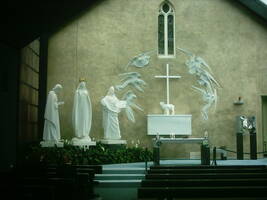
Pope Saint John Paul II's Act of Trust and Consecration to Our Lady
Shrine of Our Lady of Knock, Sunday, 30 September 1979 - in English, French, Italian, Portuguese & Spanish
"Mother, in this shrine you gather the People of God of all Ireland and constantly point out to them Christ in the Eucharist and in the Church. At this solemn moment we listen with particular attention to your words: "Do whatever my Son tells you". And we wish to respond to your words with all our heart. We wish to do what your Son tells us, what he commands us, for he has the words of eternal life. We wish to carry out and fulfil all that comes from him, all that is contained in the Good News, as our forefathers did for many centuries. Their fidelity to Christ and to his Church, and their heroic attachment to the Apostolic See, have in a way stamped on all of us an indelible mark that we all share. Their fidelity has, over the centuries, borne fruit in Christian heroism and in a virtuous tradition of living in accordance with God's law, especially in accordance with the holiest commandment of the Gospel — the commandment of love. We have received this splendid heritage from their hands at the beginning of a new age, as we approach the close of the second millennium since the Son of God was born of you, our alma Mater, and we intend to carry this heritage into the future with the same fidelity with which our forefathers bore witness to it.
Today therefore, on the occasion of the first visit of a Pope to Ireland, we entrust and consecrate to you, Mother of Christ and Mother of the Church, our hearts, our consciences and our works, in order that they may be in keeping with the faith we profess. We entrust and consecrate to you each and every one of those who make up both the community of the Irish people and the community of the People of God living in this land.
We entrust and consecrate to you the Bishops of Ireland, the clergy, the religious men and women, the contemplative monks and sisters, the seminarians, the novices. We entrust and consecrate to you the mothers and fathers, the young people, the children. We entrust and consecrate to you the teachers, the catechists, the students; the writers, the poets, the actors, the artists, the workers and their leaders, the employers and managers, the professional people, the farmers; those engaged in political and public life; those who form public opinion. We entrust and consecrate to you the married and those preparing for marriage; those called to serve you and their fellowmen in single life; the sick, the aged, the mentally ill, the handicapped and all who nurse and care for them. We entrust and consecrate to you the prisoners and all who feel rejected; the exiled, the homesick and the lonely.
We entrust to your motherly care the land of Ireland, where you have been and are so much loved. Help this land to stay true to you and your Son always. May prosperity never cause Irish men and women to forget God or abandon their faith. Keep them faithful in prosperity to the faith they would not surrender in poverty and persecution. Save them from greed, from envy, from seeking selfish or sectional interest. Help them to work together with a sense of Christian purpose and a common Christian goal, to build a just and peaceful and loving society where the poor are never neglected and the rights of all, especially the weak, are respected. Queen of Ireland, Mary Mother of the heavenly and earthly Church, a Mháthair Dé, keep Ireland true to her spiritual tradition and her Christian heritage. Help her to respond to her historic mission of bringing the light of Christ to the nations, and so making the glory of God be the honour of Ireland.
Mother, can we keep silent about what we find most painful, what leaves us many a time so helpless? In a very special way we entrust to you this great wound now afflicting our people, hoping that your hands will be able to cure and heal it. Great is our concern for those young souls who are caught up in bloody acts of vengeance and hatred. Mother, do not abandon these youthful hearts. Mother, be with them in their most dreadful hours, when we can neither counsel nor assist them. Mother, protect all of us and especially the youth of Ireland from being overcome by hostility and hatred. Teach us to distinguish clearly what proceeds from love for our country from what bears the mark of destruction and the brand of Cain. Teach us that evil means can never lead to a good end; that all human life is sacred; that murder is murder no matter what the motive or end. Save others, those who view these terrible events, from another danger: that of living a life robbed of Christian ideals or in conflict with the principles of morality.
May our ears constantly hear with the proper clarity your motherly voice: "Do whatever my Son tells you". Enable us to persevere with Christ. Enable us, Mother of the Church, to build up his Mystical Body by living with the life that he alone can grant us from his fullness, which is both divine and human.
A Mhuire na ngrás, a Mháthair Mhic Dé, go gcuire tú ar mo leas mé."
Benedict XVI's Prayer for the Church in Ireland
God of our fathers,
renew us in the faith which is our life and salvation,
the hope which promises forgiveness and interior renewal,
the charity which purifies and opens our hearts
to love you, and in you, each of our brothers and sisters.
Lord Jesus Christ,
may the Church in Ireland renew her age-old commitment
to the education of our young people in the way of truth and goodness, holiness and generous service to society.
Holy Spirit, comforter, advocate and guide,
inspire a new springtime of holiness and apostolic zeal
for the Church in Ireland.
May our sorrow and our tears,
our sincere effort to redress past wrongs,
and our firm purpose of amendment
bear an abundant harvest of grace
for the deepening of the faith
in our families, parishes, schools and communities,
for the spiritual progress of Irish society,
and the growth of charity, justice, joy and peace
within the whole human family.
To you, Triune God,
confident in the loving protection of Mary,
Queen of Ireland, our Mother,
and of Saint Patrick, Saint Brigid and all the saints,
do we entrust ourselves, our children,
and the needs of the Church in Ireland. Amen.
Papa Giovanni Paolo II's reflection on his Pilgrimage to Ireland
General Audience, Wednesday 17 October 1979 - in French, Italian, Portuguese & Spanish
"Sono andato in pellegrinaggio al santuario vivente del Popolo di Dio
1. "Il vescovo che visita le comunità della sua Chiesa è l’autentico pellegrino che ogni volta arriva a quel particolare santuario del buon Pastore, che è il Popolo di Dio, partecipante del sacerdozio regale di Cristo. Anzi, questo santuario è ogni uomo il cui "mistero" si spiega e si risolve solamente nel mistero del Verbo incarnato" (Gaudium et Spes, 22; cf. Segno di contraddizione, p. 160).
Mi si è offerta l’occasione di pronunciare le suddette parole nella cappella Matilde, quando il Papa Paolo VI mi invitò a predicare gli esercizi spirituali in Vaticano.
Queste parole mi vengono di nuovo in mente oggi, poiché sembra che esse racchiudano in sé ciò che è stato il contenuto più essenziale del mio viaggio in Irlanda e negli Stati Uniti, viaggio la cui occasione è stata l’invito del Segretario Generale dell’ONU.
Tale viaggio, in ambedue le tappe, è stato proprio un autentico pellegrinaggio al santuario vivente del Popolo di Dio.
Se l’insegnamento del Concilio Vaticano II ci permette di guardare così a ogni visita del Vescovo in una parrocchia, lo stesso si potrà dire anche di quella visita del Papa. Ritengo di avere un particolare dovere di esprimermi su questo tema. Desidero anche molto che coloro i quali, con tanta ospitalità, mi hanno accolto, sappiano che ho cercato di trovarmi in intimità con quel mistero che Cristo, Buon Pastore, ha plasmato e continua a plasmare nelle loro anime, nella loro storia e nella loro comunità. Per dare a ciò un rilievo, ho deciso di interrompere, in questo mercoledì, il ciclo di riflessioni riguardanti le parole di Cristo sul tema del matrimonio. Lo riprenderemo fra una settimana.
2. Voglio anzitutto dare testimonianza dell’incontro col mistero della Chiesa in terra irlandese. Non dimenticherò mai quel luogo, nel quale ci siamo brevemente fermati, nelle ore mattutine, la domenica del 30 settembre: Clonmacnois. Le rovine dell’abbazia e del tempio parlano della vita che ivi una volta pulsava. Si tratta di uno di quei monasteri, in cui i monaci irlandesi non soltanto innestarono il cristianesimo nell’Isola Verde, ma da dove lo portarono anche agli altri paesi dell’Europa. È difficile guardare quel complesso di rovine soltanto come un monumento del passato; le intere generazioni dell’Europa devono ad esse la luce del Vangelo e la struttura portante della loro cultura. Quelle rovine sono sempre cariche di una grande missione. Costituiscono sempre una sfida. Parlano sempre di quella pienezza di vita, alla quale ci ha chiamati Cristo. È difficile che un pellegrino giunga in quei posti senza che quelle tracce del passato, apparentemente morto, rivelino una dimensione permanente e non peritura della vita. Ecco l’Irlanda: nel cuore della missione perenne della Chiesa, alla quale ha dato inizio San Patrizio.
Pellegrinando sulle sue orme, camminiamo in direzione della sede primaziale di Armagh, e ci fermiamo, strada facendo, a Drogheda, dove per l’occasione erano solennemente esposte le reliquie del Santo Olivier Plunkett, Vescovo e Martire. Soltanto inginocchiandosi davanti a quelle reliquie, si può esprimere tutta la verità sull’Irlanda storica e contemporanea e si possono toccare anche le sue ferite, con la fiducia che esse si rimargineranno e non impediranno a tutto l’organismo di pulsare con la pienezza della vita. Tocchiamo dunque anche i dolorosi problemi contemporanei, ma non cessiamo di pellegrinare attraverso quel magnifico santuario del Popolo di Dio, che si apre davanti a noi, su tanti luoghi, in tante meravigliose assemblee liturgiche, durante le celebrazioni dell’Eucaristia a Dublino, a Galway, a Knock Santuario Mariano, a Maynooth, a Limerick. E, in particolare, ho e avrò sempre presente nel mio pensiero anche l’incontro col Presidente dell’Irlanda Signor Patrick J. Hillery, e con le illustri Autorità di quella Nazione. Ricordino tutti coloro con cui mi sono incontrato – i sacerdoti, i missionari, i fratelli e le sorelle religiose, gli alunni, i laici, gli sposi e i genitori, la gioventù irlandese, i malati, tutti – ricordino soprattutto gli amati fratelli nell’Episcopato, che sono stato presente in mezzo a loro come un pellegrino, che visita il Santuario del Buon Pastore, il quale abita in tutto il Popolo di Dio; che ho camminato attraverso quel magnifico alveo della storia della salvezza che, dai tempi di San Patrizio, è diventato l’Isola Verde, con il capo chino e il cuore grato, cercando, insieme a loro, le strade che conducono verso il futuro.
3. Lo stesso desidero dire anche ai miei Fratelli e Sorelle di oltre Oceano. Giovane è ancora la loro Chiesa, perché giovane è la loro grande società: sono passati solo due secoli della sua storia sulla mappa politica del globo. Desidero ringraziarli tutti, per l’accoglienza che mi hanno riservato; per la risposta che hanno dato a questa visita, a questa presenza, necessariamente breve. Confesso che sono rimasto sorpreso per tale accoglienza e per tale risposta. Abbiamo persistito sotto la pioggia dirotta durante la messa per i giovani, la prima sera, a Boston. La pioggia ci ha accompagnati sulle strade di quella città, così come poi anche sulle strade di New York, fra i grattacieli. Quella pioggia non ha impedito a tanti uomini di buona volontà di perseverare nella preghiera, di attendere il momento del mio arrivo, la mia parola, la mia benedizione.
Per me rimarranno indimenticabili i quartieri di Harlem, con la maggioranza della popolazione negra; di South Bronx, con i nuovi venuti dai paesi dell’America Latina; l’incontro con la gioventù nel Madison Square Garden e nel Battery Park sotto la pioggia torrenziale e la tempesta furiosa, e nello stadio a Brooklyn, quando finalmente è apparso il sole. E il giorno precedente il grande Yankee Stadium, strapieno per la partecipazione alla liturgia eucaristica. E poi: l’illustre Philadelphia, la prima capitale degli Stati indipendenti con la sua campana della libertà, e forse quasi due milioni di partecipanti alla Santa Messa pomeridiana, al centro stesso della città. E l’incontro con l’America rurale a Des Moines. E in seguito, Chicago, in cui in modo più appropriato si è potuta sviluppare l’analogia sull’argomento "e pluribus unum". Infine la città di Washington, capitale degli Stati Uniti, con tutto il ponderoso programma, fino all’ultima Messa sullo sfondo del Campidoglio.
Il Vescovo di Roma, come pellegrino, è entrato, sulle orme del Buon Pastore, al suo santuario nel nuovo continente e ha cercato di vivere insieme con voi la realtà della Chiesa, che emerge dall’insegnamento del Concilio Vaticano II, con tutta la profondità e rigorosità, che questa dottrina porta con sé. Sembra infatti che tutto ciò sia stato accompagnato soprattutto da una grande gioia, per il fatto che siamo questa Chiesa; che siamo il Popolo, al quale il Padre offre redenzione e salvezza nel suo Figlio e nello Spirito Santo. La gioia per il fatto che – tra tutte le tensioni della civiltà contemporanea, dell’economia e della politica – esiste proprio tale dimensione dell’esistenza umana sulla terra; e che noi vi partecipiamo. E benché la nostra attenzione sia orientata anche verso tali tensioni, che vogliamo risolvere in modo umano e degno, tuttavia la divina gioia del Popolo, che si rende consapevole di essere il Popolo di Dio, e che in questo carattere cerca la propria unità, è più grande e piena di speranza.
4. In questo contesto, anche le parole pronunciate dinanzi all’Organizzazione delle Nazioni Unite sono diventate un frutto particolare del mio pellegrinaggio su queste importanti tappe della storia di tutta la Chiesa e del cristianesimo. Che cos’altro potevo dire dinanzi a quel supremo "forum" di carattere politico, se non ciò che costituisce il midollo stesso del messaggio evangelico? Le parole di un grande amore per l’uomo, che vive nelle comunità di tanti popoli e nazioni, entro le frontiere di tanti Stati e sistemi politici. Se l’attività politica, nelle dimensioni dei singoli Stati e nelle dimensioni internazionali, deve assicurare un reale primato all’uomo sulla terra, se deve servire alla sua vera dignità, è necessaria la testimonianza dello spirito e della verità, resa dal Cristianesimo e dalla Chiesa. E perciò, a nome del Cristianesimo e della Chiesa, sono grato a tutti coloro che il 2 ottobre 1979 hanno voluto ascoltare le mie parole nella sede dell’ONU a New York. Come pure sono profondamente grato per l’accoglienza che mi è stata riservata, il 6 ottobre, dal Presidente degli Stati Uniti, Signor Jimmy Carter, nello storico incontro alla Casa Bianca con lui e con la sua cara famiglia, nonché con tutte le alte Autorità colà riunite.
5. "Siamo servi inutili. Abbiamo fatto quanto dovevamo fare" (Lc 17,10). Così insegnava Cristo ai suoi apostoli. Anch’io, con queste parole che provengono dalla mia più profonda convinzione, termino la mia odierna allocuzione, la cui necessità mi è stata dettata dall’importanza dell’ultimo mio viaggio. Almeno in questo modo io ripaghi quel grande debito che ho contratto nei confronti del Buon Pastore e nei confronti di coloro che hanno aperto le strade della mia peregrinazione."
Pope St John Paul II's Homily at a Mass for Irish Pilgrims
Vatican Gardens, Friday 23 April 1982 - in English, Italian & Portuguese
"Dear brothers and sisters from Ireland,
Last Wednesday I had the joy of welcoming the Garda Sochána na hireann at the General Audience. This gave me the opportunity to reiterate my gratitude to you and to encourage you in your Christian lives. And today we have the occasion to be together once again as you advance on your pilgrimage of faith. We are together with our Blessed Mother Mary, at her shrine in the Vatican, asking her to lead us to Jesus and to assemble us around the person of her Son, who is our Lord and Saviour.
1. Indeed, we are experiencing this morning the reality of the scene depicted for us in the Gospel.
Gathered like the disciples on the hillside by the Sea of Galilee, we have Jesus in our midst. He is the centre of our assembly, the centre of our very lives. Like the disciples we know that we are the object of his care and concern. He is the Good Shepherd who loves us deeply and tenderly. We have come to listen to him, to watch him as he gives thanks to his Father; we have come in order to share in his great act of thanksgiving. We have come so that we too, like the disciples, can be nourished by his word and by the bread that he offers us for eternal life. Each of us has come to this Eucharistic assembly, filled with the sentiments that the psalmist expresses this morning: “I am sure I shall see the Lord’s goodness in the land of the living”.
2. Being all together, with Mary, in the company of Jesus, gives us a deep joy and a wonderful reassurance. We are prompted by the Holy Spirit to give voice to our trust and confidence and to our hope in Jesus Christ, the Son of God and Son of Mary: “The Lord is my light and my help; whom shall I fear? The Lord is the stronghold of my life...”.
The presence of Christ fortifies and sustains us. Jesus is with us as he was with the Apostles in all the hardships that they encountered in bearing witness on this name. And just as the Apostles experienced many difficulties for speaking in the name of Jesus, we too shall come to understand ever more that authentic Christian living demands constant effort. There are obstacles of many kinds, but God is in us with his grace, ever urging us to fidelity, ever inviting us to live in accordance with the message we have received.
3. In imitation of the Apostles, we must continue to proclaim, by word and action, the Good News of the Paschal Mystery. The Good News of new life in Christ, of Easter peace and reconciliation, has been entrusted to all of us. It must be lived and proclaimed not only in the public temples of our churches but also in every private house, in every “domestic church”, which is the home. The Good News of Christ’s Resurrection must be lived and proclaimed in every home in Ireland.
In the Acts of the Apostles we are told finally that the “proclamation of the Good News of Christ Jesus was never interrupted”. Yes, the Good News must never be interrupted, as long as our earthly pilgrimage continues. With God’s help, remain for ever united among yourselves, with Christ in your midst. And be always guardians of the Good News, guardians of Christ’s peace. Amen."
If you'd be up for giving your something about Mary,
please do get in touch with the Totus2us team
- as well as hopefully bringing you joy,
you'd be really helping Totus2us ♥
Totus tuus ego sum et omnia mea tua sunt.
Accipio te in mea omnia. Praebe mihi cor tuum, Maria. - St Louis de Montfort
Saint John Paul II took his motto Totus Tuus from this quote.
"I am totally yours and all that I have is yours.
I accept you for my all. O Mary, give me your heart.”

